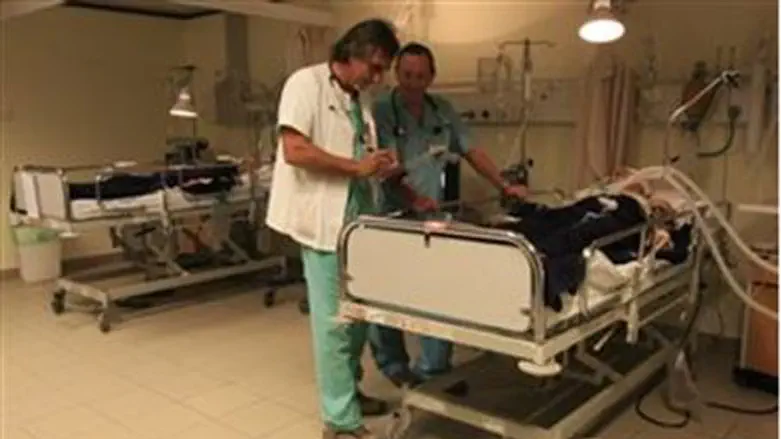
It may seem as if Israel has been hard hit by the flu this year, but it's actually been more or less an average year for flu infections, says Professor Dan Engelhard of Hadassah Ein-Kerem Medical Center. “But the flu, even in an average year, can still be fatal, and hospital beds can still be full, as they are this year.”
Actually, explains Dr. Engelhard, statistics do show that there has been a higher flu infection rate this season, with cases being reported already in November. “Usually, the flu infections – the A series and the B series – come at different times during the winter, and this year we seem to have been inundated with both at the same time,” so it appears that the rate of infection is higher, Engelhard told Israel National News.
On the other hand, Engelhard says, the spike in cases of seasonal flu could be just because of better reporting and diagnosis. “After the H1N1 pandemic last year, hospitals updated their flu examination systems, taking into account flu as a possible diagnosis in many more incidents of complaints by patients. They have continued the practice this year, and as a result many cases that may have been diagnosed differently in the past are now being designated as flu, often aggravated by another condition or infection.”
But, Engelhard says, flu season, even in an “off” year, can still be dangerous. Recently, a 15 year old in Hadera died from complications caused by flu, and Engelhard, who is the director of pediatrics in Hadassah Ein-Kerem, says that all his beds are full. “We have four kids on respirators in our department,” he says. “Most at risk, of course, are the elderly and children, but flu can strike even healthy adults – fatally.”
The best – and really only – solution, Engelhard says, is to get a flu vaccine shot. “It's really the only way to deal with the flu properly, and the more people that get vaccinated, the healthier everyone around them is.” As many as 20% of workers call in sick for at least several days each winter after being sidelined with the flu, “and that represents a tremendous drain on the economy.”
Unfortunately, flu vaccination rates are far less than the authorities would like to see. “Israelis by nature resist preventative things like flu shots, because they believe it can't happen to them – until it does,” says Engelhard. In addition, the internet in recent years has facilitated the ability of “crackpot” groups, as he calls them, who reject the idea of inoculation altogether. “All of us have seen the e-mails and messages from these groups. Unfortunately they are doing a great disservice to the country and the world.” The allegations of nefarious intent on the part of authorities, which was very prominent last year during the H1N1 pandemic, “are ridiculous,” he says, and the best thing anyone can do for themselves and their loved ones – not to mention the economy – is to get a flu vaccination, he says.
Israel – and indeed, the rest of the world – is lucky in one aspect: The H1N1 swine flu virus, the subject of so much consternation last year, is a minor factor this year. “The rate of infection last year was five times what we have seen so far this year, so everyone is quite relieved that we are not facing the same threat.” He also doesn't expect that last year's pandemic will return this season, and hopefully not next year either. “A lot of people were inoculated, so we hopefully will have that strain under control, at least for a little while,” Engelhard says. But that positive development should not allow anyone – especially those at risk – to slip into a state of complacency. “H1N1 flu is dangerous, but so is 'regular' flu,” says Engelhard. “Anyone who wants to protect themselves is advised to get an inoculation as soon as they can.”